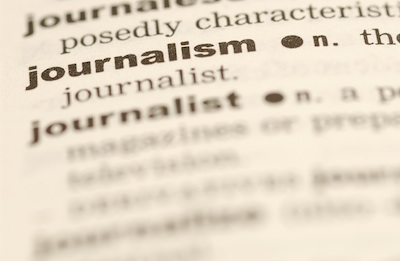Main Content
Lesson 3: Journalism's Obligations to the Public it Serves
A Journalist's Obligations

The author of our text opens Chapter 4 with the notion that journalists sometimes find that their journalistic duties conflict with their moral obligations. Yes, it’s true that journalists are often forced to “wear many hats”—and not just because they are frequently called upon to produce multimedia versions of the stories they’re trying to tell!
In the introduction, we mentioned six distinct roles or societal expectations the journalist might be called upon to meet.
- Citizen: Just like everyone else in society, the journalist would be expected to obey the law.
- Committed observer: All reporters are observers, it's part of their job so there's an element of it in every story. When we say committed reporter, though, we are referring to the reporter staying with a story and observing what happens when there's really tough or disturbing stuff going on. As committed observers, journalists stay with it and keep reporting back to the public.
- Watchdog: Hold the powerful accountable.
- Truth teller: Building on the roles of observer and watchdog, the role of truth teller means serving the informational needs of the public, telling the story regardless of the consequences.
- Empowerer: Staying on the story and helping the people solve the problem is how the empowerer role works. It's beyond normal reporting because there is a *call to action* to the public to get involved or make changes.
- Participant or helper: This is when journalists get involved with a story in the hope of making things better. This is an active stance, they are doing something to intervene.
Although these roles are somewhat neatly defined it is easy to see that there is overlap between some and that conflicts can arise for journalists when they try to live up to all of the expectations at the same time. These conflicts arise from the coverage of all kinds of stories: from sports to politics or entertainment to business. Let’s turn to the police beat as a way to illustrate the potential for conflicting moral and journalistic obligations.
Case Study
Your community has been hit by a major tornado which has devasted large parts of the town.
| Citizen |
While capturing video footage, you inadvertently record a man breaking into a damaged home and carrying out a TV. As a citizen, you are obliged to follow the same laws as everyone else. There's no law about witnessing crimes, but normal citizens might feel obligated to report them. Should you alert the police and/or give them your footage? |
| Committed observer |
As a committed observer, you stay with the story beyond the initial fact-based reporting. You your obligation would be to look for the angles of the story that the citizens need to know. Perhaps it is beyond just the illegality of drug dealing and might also include stories about who is buying the heroin, where the transactions occur, and what signs people should look for if they are worried about a loved one. |
| Watchdog | Who are the people in power you might look to hold accountable? Did the warning sirens go off? Are the police doing an adequate job of protecting the homes and busineses that were damaged? |
| Empowerer | As an empowerer, you would strive to inform the public about how they can take action. What donations are needed? Where do people go if they need help? |
| Truth teller | As a “truth teller,” you would simply write the story—the who, what, where, when, why about the tornado and its aftermath. |
| Helper or participant | As a “helper or participant,” you might work at a shelter passing out blankets so you can see and talk to the people most affected. You might donate blood as part of a story about a blood shortage. But what if by trying to help, you’re viewed as changing reality and your news organization’s reputation suffers? Or, by intervening, you change the nature of the news itself? |
